肥胖与睡眠障碍:双向关系
IF 3.3
3区 医学
Q2 CARDIAC & CARDIOVASCULAR SYSTEMS
Nutrition Metabolism and Cardiovascular Diseases
Pub Date : 2025-03-15
DOI:10.1016/j.numecd.2025.104014
引用次数: 0
摘要
目的:肥胖和睡眠障碍是非常普遍的疾病,对公众健康有着深远的影响。新出现的证据强调了这两种情况之间的双向关系,在行为、生理和激素机制的复杂相互作用中,每一种情况都会加剧另一种情况。睡眠不足和睡眠质量差会导致食欲激素(如瘦素和胃饥饿素)失调、热量摄入增加和体力活动减少,从而导致能量失衡。相反,睡眠障碍,如阻塞性睡眠呼吸暂停综合征(OSAS)、失眠和不宁腿综合征(RLS)在肥胖人群中更为常见。资料综合:本综述探讨了这种关系的病理生理机制,包括炎症、自主神经失调和神经内分泌途径的作用。睡眠不足会加剧代谢综合征的组成部分,包括胰岛素抵抗和血脂异常,进一步加剧体重增加。同样,肥胖引起的睡眠障碍会导致促炎状态、血管功能障碍和交感神经过度激活,从而增加心脏代谢风险。OSA和RLS等特殊疾病被视为这种相互依赖的模型,强调它们的共同途径和临床意义。结论:肥胖和睡眠障碍之间的双向联系强调了将睡眠评估和管理纳入肥胖治疗策略的重要性。解决这种关系可以缓解心脏代谢合并症的进展并改善整体健康结果。此外,肥胖、睡眠障碍和心理健康之间相互交织的动态关系——由炎症途径、激素失调和神经行为因素介导——强调了对针对身体、心理和睡眠相关维度的综合治疗方法的迫切需要,以提高健康和生活质量。本文章由计算机程序翻译,如有差异,请以英文原文为准。
Obesity and sleep disorders: A bidirectional relationship
Aims
Obesity and sleep disorders are highly prevalent conditions with profound implications for public health. Emerging evidence highlights a bidirectional relationship between these two conditions, with each exacerbating the other in a complex interplay of behavioral, physiological, and hormonal mechanisms. Sleep deprivation and poor sleep quality contribute to energy imbalance through dysregulation of appetite hormones (e.g., leptin and ghrelin), increased caloric intake, and reduced physical activity. Conversely, sleep disorders such as obstructive sleep apnea syndrome (OSAS), insomnia, and restless leg syndrome (RLS) are significantly more common in individuals with obesity.
Data synthesis
This review explores the pathophysiological mechanisms underlying this relationship, including the roles of inflammation, autonomic dysregulation, and neuroendocrine pathways. Sleep loss exacerbates metabolic syndrome components, including insulin resistance and dyslipidemia, further perpetuating weight gain. Similarly, obesity-induced sleep disorders lead to pro-inflammatory states, vascular dysfunction, and sympathetic overactivation, compounding cardiometabolic risks. Specific conditions like OSA and RLS are examined as models of this interdependence, emphasizing their shared pathways and clinical implications.
Conclusions
The bidirectional link between obesity and sleep disorders underscores the importance of integrating sleep assessment and management into obesity treatment strategies. Addressing this relationship could mitigate the progression of cardiometabolic comorbidities and improve overall health outcomes. Moreover, the intertwined dynamics between obesity, sleep disorders, and mental health—mediated by inflammatory pathways, hormonal dysregulation, and neurobehavioral factors—highlight the critical need for integrated treatment approaches targeting physical, psychological, and sleep-related dimensions to enhance health and quality of life.
求助全文
通过发布文献求助,成功后即可免费获取论文全文。
去求助
来源期刊
CiteScore
6.80
自引率
2.60%
发文量
332
审稿时长
57 days
期刊介绍:
Nutrition, Metabolism & Cardiovascular Diseases is a forum designed to focus on the powerful interplay between nutritional and metabolic alterations, and cardiovascular disorders. It aims to be a highly qualified tool to help refine strategies against the nutrition-related epidemics of metabolic and cardiovascular diseases. By presenting original clinical and experimental findings, it introduces readers and authors into a rapidly developing area of clinical and preventive medicine, including also vascular biology. Of particular concern are the origins, the mechanisms and the means to prevent and control diabetes, atherosclerosis, hypertension, and other nutrition-related diseases.

 求助内容:
求助内容: 应助结果提醒方式:
应助结果提醒方式:


